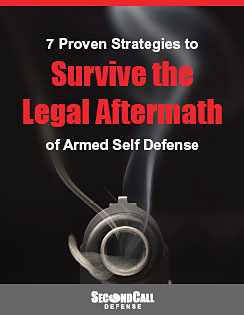Exceptions to Justifiable Use of Deadly Force
We’ve written about when it is justifiable to use deadly force.
To quote from our own previous article:
While specific laws vary, it is generally accepted in every state in the U.S. that you have a right to defend yourself with lethal force. Whether you exercise this right legally is based on the “reasonable man” doctrine. In other words, would a reasonable person in the same situation be likely to use deadly force in self defense? What is considered reasonable?
Self defense expert Massad Ayoob says this: “Deadly force is justified only when undertaken to prevent imminent and otherwise unavoidable danger of death or grave bodily harm to the innocent.”
The article goes on to explain the three elements you should look for in any defensive situation that helps clarify if deadly force is reasonable and legally justifiable.
However, there’s another side to this coin. There are also situations where deadly force is generally not considered justifiable. These are considered “exceptions” if you’re trying to argue self defense when deadly force has been used.
Initial Aggressor – Once again, laws vary from state to state. However, in most cases, if you are the one who initiates violence, you risk losing the ability to argue self defense. If you throw the first punch, then later start losing the fight and pull a gun to defend yourself, you may be considered the bad guy.
Provocation – The law recognizes that people have emotions and one of those emotions is anger. So if you provoke someone to the point where they attack you, you might be justified in using deadly force, or you might not. In simple terms, when you poke the bear, no one is surprised when you get mauled. It’s hard to argue that you’re the innocent victim when you’re insulting someone’s mother.
Escalation – Anything you do that causes a bad situation to get worse can be held against you. For example, if someone is verbally threatening you and you respond with counter threats, you are escalating the situation. Escalation means you are playing a part in creating a deadly force encounter.
Committing Felony or Unlawful Act – If you are robbing a gas station, physically assaulting someone, or otherwise committing a crime, and in the process you are faced with a deadly threat, you will have a very difficult time arguing self defense. It depends on the facts of the case, but in general the law is not designed to protect criminals.
Mutual Combat – This is a legal term that refers to a fight both parties enter into willingly. Old-fashioned schoolyard fights or even duels would be considered mutual combat because the combatants would set a time and place to meet and settle the score. This also applies to boxing matches, mixed martial arts, wrestling, or any other type of combat.
Reengagements and Pursuit – Given the premise that justifiable use of deadly force must be something that is thrust upon you and not something you cause or seek out willingly, you can hurt your self defense argument if your attacker runs away and you then chase him in order to continue the conflict.
Example: You shoot someone who breaks into your house, the invader runs out the front door, and you chase him down the street, shooting at him as he runs.
There is a single idea that threads its way through all these exceptions. In legal terms, we would say that if one of these exceptions applies to you, you have lost the “mantle of innocence.” In any self defense situation, it is imperative that your actions are viewed as reasonable and necessary. If they are not, then you will not be viewed as the innocent victim who was forced to defend himself, but rather as someone who created or at least helped to create the situation.
In all cases, you want to wear the mantle of innocence like a halo so people look at you and think, “Poor guy. He had no choice but to pull the trigger.” Once you lose the mantle of innocent, your legal ordeal becomes an uphill battle.
“

